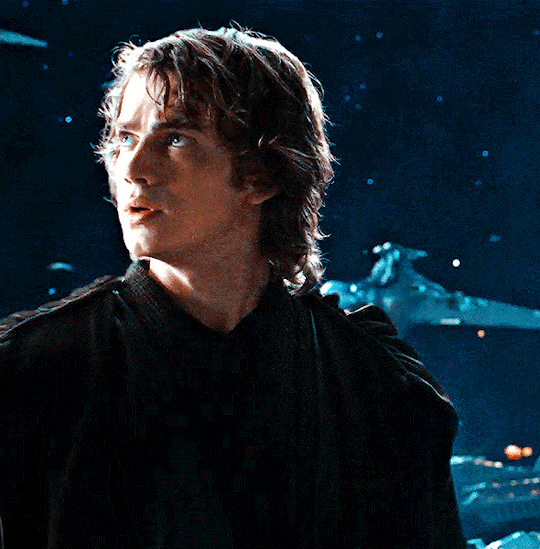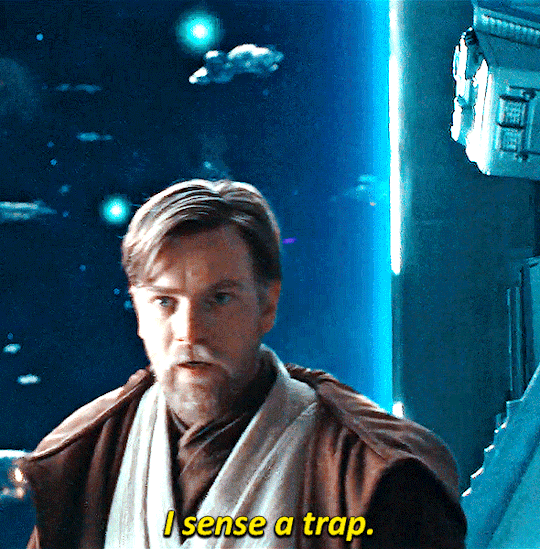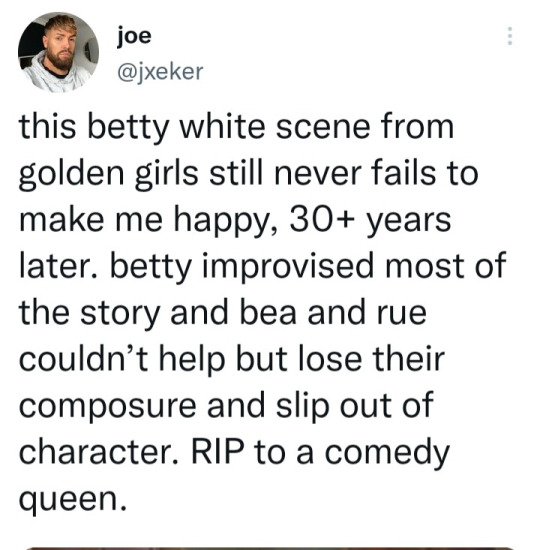Text
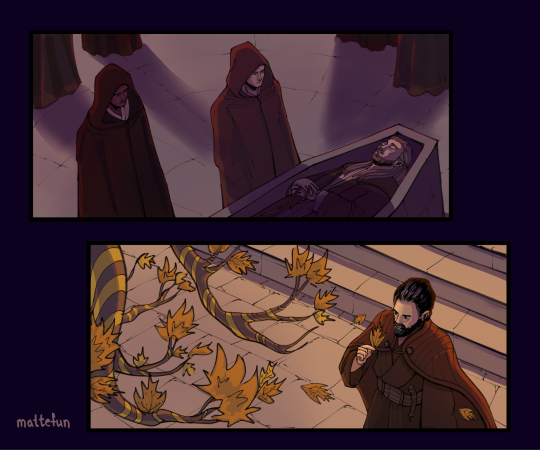
Dooku and Obi-Wan, two people who both loved Qui-Gon.
This art parallels each other's events so to speak. While Dooku is sad for Qui-Gon near their memorial place, Obi-Wan gives his padawan braid to the Master and says goodbye to him one last time
1K notes
·
View notes
Text
In 1850, a farmer found a secret village. It was later determined to be older than the Great Pyramids of Egypt. Archeologists estimated that 100 people lived in this village named Skara Brae, the "Scottish Pompeii." The houses were connected to each other by tunnels, and each house could be closed off with a stone door.

23K notes
·
View notes
Text
Entry level jobs haven't existed since the 2008 crash. 90% of hiring managers won't hire recent graduates. A quarter of job listings are ghost jobs. Companies hire part time so that they don't have to give benefits. Federal minimum wage hasn't increased since 2009. The True Unemployment Rate is 25%. Master's are the new bachelor's. For most the job search takes over a year. 75% of resumes are never. actually seen by the hiring team.

26K notes
·
View notes
Note
Hi! I'm a slytherin and my patrons is a black swan, could you do an analysis? Thanks!
@pheonixortheflame also asked for this one, so this is for both of you! :)

Black swans, like their white brethren, are associated with love, grace, and transformation. The black variety of these creatures are special, however, because in the olden days a “black swan” was an expression in Europe that, like “when pigs fly,” represented an anomaly or an impossibility. Naturally when the birds were discovered in Australia, the expression evolved, and In today’s world it can refer to an unexpected but influential event. Black swans also are generally associated with maturity, whereas white swans are associated more with purity. Black swans also have an unfortunate connotation of deception thanks in large part to the ballet Swan Lake, where a wicked sorcerer’s daughter (depicted in a costume similar to a black swan) masquerades as our heroine (cursed into the form of a white swan) to deceive our heroine’s lover the prince.
Having a Black Swan as your Patronus means you find comfort in love, but unlike the White Swan, which focuses on love from others, you find the love you seek from yourself. And as much as this can sound selfish, self-love is a very undervalued thing, one that Slytherins know very well is important. You need to love yourself if you are to truly love anyone else…because love is a give-and-take thing. If people love you, then you must take care of yourself, because your loved ones should want you to be happy. This is the wisdom the Black Swan imparts. When you look in the mirror and hate what you see, and all you know is darkness and misery, your guardian will appear to remind you of how amazing you are. It will remind you of all of the people you’ve touched – the things you’ve achieved – the good deeds you’ve done – your talents – your values – the dreams you have for the future. And then, all at once, you will be on your feet, holding your head up high, because you know you are beautiful and strong enough to take on the world, if you so choose.
(As a side, I apologize for not including a gif of the animal – you type in “black swan”, “black swans”, “black swans animals” and all sorts of other tags, and still all you get is either Swan Lake, Black Swan the film, Twilight, or Once Upon a Time. Oi. At least this one’s pretty. XD)
~Tory
57 notes
·
View notes
Text
Soft Obikin Art by Curiphynn

Don't mind me while I squeal into my pillow (don't want to upset my parents or the neighbours!) from this absolutely gorgeous, soft artwork by the super talented @curiphynn -- like holy kriffing bantha poop, guys. This artwork came out so pretty! Ahhh! I cannot stop staring at their pose, that possessive arm, their loving looks, the robe hanging off of Obi-Wan for its dear life, the warm colours . . . just adjfjasdfljkasdjkjksda!!!! I'm turning into a gibberish mess here. Life is good now that I have this beautiful Obikin art.
Thank you, thank you, thank you, @curiphynn ~ It's truly an honour to get a commed art from you. You've exceeded my expectations, and I am super happy! Thank you again!!!
156 notes
·
View notes
Text
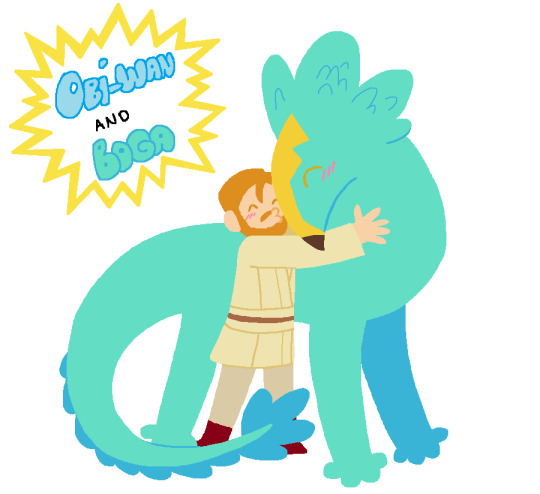
Boga best star wars character ever any other opinions are wrong 😤😤😤🔪🔪🔪
468 notes
·
View notes
Text
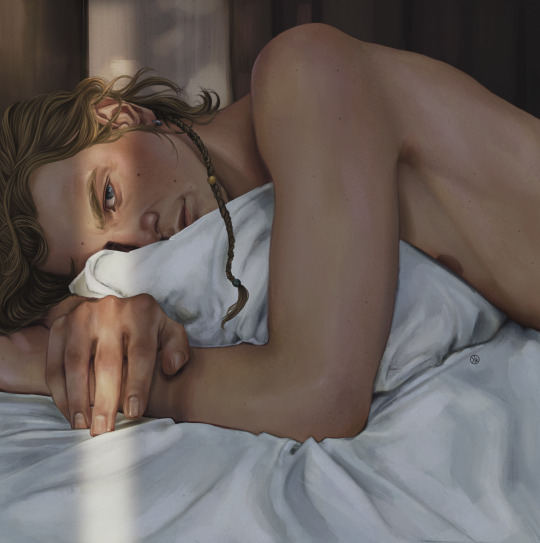
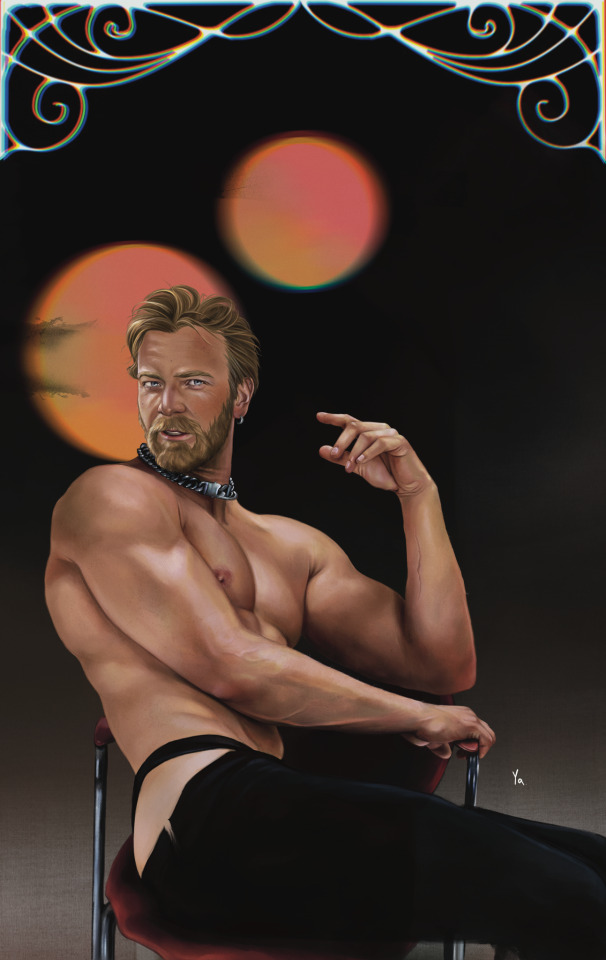

Hiii I’m Yas and I’m starting all over again. I’ve lost all my passwords so I’ve decided to make a new pages for my art and make it only Star Wars. Here some of my artworks if you was following or u are someone new. Let’s have some fun idk.
Also I’m waiting for ur art suggestions cause my art block isn’t blocking anymore
269 notes
·
View notes
Text
As part of MerMay I am trusting the beautiful Tumblr community to help me find the artist of these pieces
I am in love with them, and I'm sure lots of you will like them (including @inkybyl hehe)
You guys have pulled through before, let's do it again!!! Rahhhhhh




713 notes
·
View notes
Photo
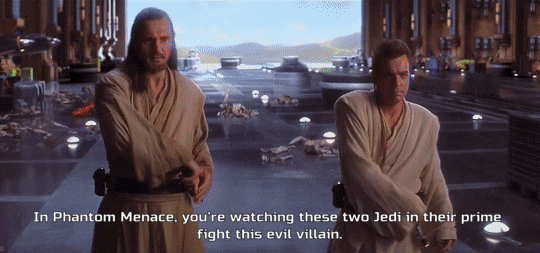
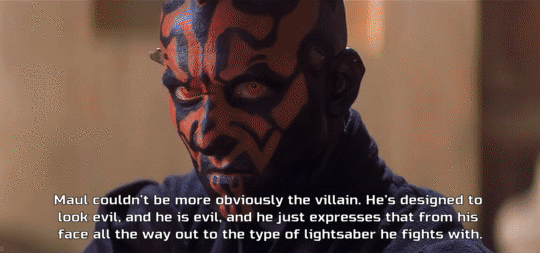


OKAY, IF I’M GONNA DO THIS, I’M GONNA DO IT PROPERLY. WHICH MEANS YEAH IT’S GONNA GET REALLY LONG. A couple of things to say ahead of time: Lucasfilm’s Story Group has always said CANON > WORD OF GOD when it comes to these matters, so when I quote canon examples from supplementary materials that contradict what he says, that’s LF’s official position, but that doesn’t mean that an influential person like Dave’s views couldn’t affect how things will be shaped in the future, like Deborah Chow listening to this may be influenced by it on the Obi-Wan show, despite that Master & Apprentice contradicts him. It’s an incredibly murky area! Mileages are going to vary. Another thing to keep in mind is that Dave Filoni never worked on The Phantom Menace, that was long, long before his time at Lucasfilm (which I think he joined sometime around 2007? and TPM was released in 1999), that he has worked with George more than probably anyone else, but we cannot and should not treat him as infallible or the True Authority on things, because even Dave himself has said things like: “I mean, I know why I did that and what it means, but I don’t like to explain too much. I love for the viewers to watch stuff and come up with their own theories – and they frankly come up with better things that I intended.” –Dave Filoni, Entertainment Tonight 2020 interview Or, in the same episode as the above Qui-Gon interpretation:
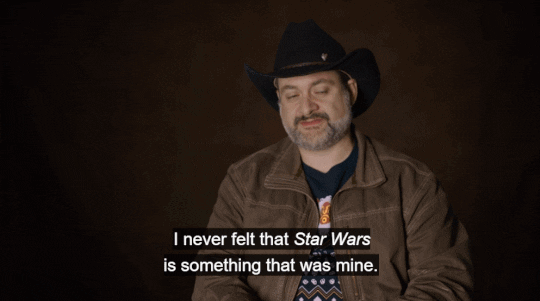


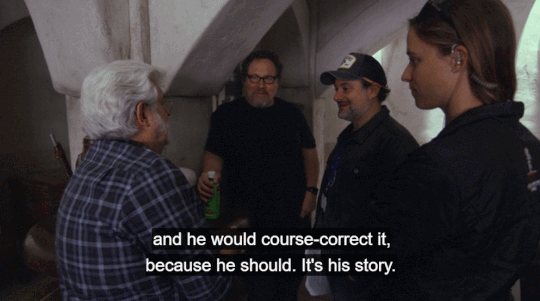
So, when I dig into this, I’m not doing this out of a sense of malice or even that I suddenly hate Dave or don’t appreciate all the incredible things he’s brought to SW, but in that I disagree with his take, Dave understands that he doesn’t always get it right, that he enjoys that fans come up with different things than he does and sometimes he likes those even more. There’s room for both of us and, for all that Dave mentions George a lot (and, hey, fair enough, the guy worked with George and I’m just quoting what George Lucas has said) doesn’t mean that this is straight from George, especially because I have never seen George Lucas utter so much as a peep about how the Jedi were responsible for Anakin’s fall. He has explicitly and frequently talked about how Anakin’s fall was his own choice, as well as I’ve never seen him say anything Jedi-critical beyond “they were kind of arrogant about themselves”. I have read and watched every George Lucas interview I could get my hands on and maybe I’m still missing something, but that’s literally the extent of him criticizing the Jedi I have EVER seen. (It’s from the commentary on AOTC where he put in the scene with Jocasta to show they were full of themselves, but I also think it’s fair to point out that Obi-Wan immediately contradicts this by going to Dex for help, showing that it’s not necessarily a Jedi-wide thing.) Before I go further, I want to say: this is not a post meant to tear down Qui-Gon, he is a character I actually really do love, but the focus is on showing why the above interpretation of him is wrong, which means focusing on Qui-Gon’s flaws. He has many wonderful qualities, he is someone who cared deeply and was a good person, I think things would have been better had he lived! But Anakin’s choices did not hinge on him, because Anakin’s choices were Anakin’s, that has always been the consistent theme of how George talks about him, the way he talks about the story is always in terms of “Anakin did this” or “Anakin chose that”, and the Jedi are very consistently shown as caring, they believed very much in love and Dave’s own show (well, I say “his own show”, but honestly TCW was George’s baby primarily and he had a lot of direct, hands-on say in crafting it, through at least the first five seasons) is plenty of evidence of that. I’m not going to quote the full thing because this is already a monster post, I’m just going to focus on the Jedi stuff, because I like the other points a lot, but if you want the full text, it’s here. The relevant part is: “In Phantom Menace, you’re watching these two Jedi in their prime fight this evil villain. Maul couldn’t be more obviously the villain. He’s designed to look evil, and he is evil, and he just expresses that from his face all the way out to the type of lightsaber he fights with. What’s at stake is really how Anakin is going to turn out. Because Qui-Gon is different than the rest of the Jedi and you get that in the movie; and Qui-Gon is fighting because he knows he’s the father that Anakin needs. Because Qui-Gon hasn’t given up on the fact that the Jedi are supposed to actually care and love and that’s not a bad thing. The rest of the Jedi are so detached and they become so political that they’ve really lost their way and Yoda starts to see that in the second film. But Qui-Gon is ahead of them all and that’s why he’s not part of the council. So he’s fighting for Anakin and that’s why it’s the ‘Duel of the Fates’ – it’s the fate of this child. And depending on how this fight goes, Anakin, his life is going to be dramatically different. “So Qui-Gon loses, of course. So the father figure, he knew what it meant to take this kid away from his mother when he had an attachment, and he’s left with Obi-Wan. Obi-Wan trains Anakin at first out of a promise he makes to Qui-Gon, not because he cares about him. When they get Anakin, they find him on Tatooine, he says “Why do I feel like we’ve found another useless lifeform?” He’s comparing Anakin to Jar Jar and he’s saying “this is a waste of our time, why are we doing this, why do you see importance in these creatures like Jar Jar Binks and this ten-year-old boy? This is useless.” “So, he’s a brother to Anakin eventually but he’s not a father figure. That’s a failing for Anakin. He doesn’t have the family that he needs. He loses his mother in the next film. He fails on this promise that he made, “mother, I’m going to come back and save you”. So he’s left completely vulnerable and Star Wars is ultimately about family. So that moment in that movie which a lot of people I think diminish, “oh there’s a cool lightsaber fight”, but it’s everything that the entire three films of the prequels hangs on, is that one particular fight. And Maul serves his purpose and at that point died before George made me bring him back, but he died.“ –Dave Filoni I’m going to take this a piece at a time to show why I really disagree with the content of both the movies and The Clone Wars supporting what Dave says and, instead, contradicts it a lot. The rest of the Jedi are so detached and they become so political that they’ve really lost their way and Yoda starts to see that in the second film. He doesn’t explain what this means, but I’m pretty sure that he’s referring to this conversation: OBI-WAN: “I am concerned for my Padawan. He is not ready to be given this assignment on his own yet.” YODA: “The Council is confident in its decision, Obi-Wan.” MACE WINDU: “The boy has exceptional skills.” OBI-WAN: “But he still has much to learn, Master. His abilities have made him… well…. arrogant.” YODA: “Yes, yes. A flaw more and more common among Jedi. Hmm… too sure of themselves they are. Even the older, more experienced ones.” MACE WINDU: “Remember, Obi-Wan, if the prophecy is true, your apprentice is the only one who can bring the Force back into balance.” OBI-WAN: “If he follows the right path.” None of that has anything to do with being “detached” and, further, I think this is something that’s come up with Dave’s view of Luminara a lot, because he’s described her (re: the Geonosis arc): “We were trying to illustrate the difference between the way Anakin is raising his Padawan, and how much he cares about her, and the way Luminara raises her Padawan. Not that Luminara is indifferent, but that Luminara is detached. It’s not that she doesn’t care, but she’s not attached to her emotionally.” Here, he says that the Jedi care, in the above, he says that the Jedi don’t care, which makes me think there’s a lot of characterization drift as time goes on, especially when fandom bombards everyone with the idea that the Jedi were cold, emotionless, and didn’t care. However, look at Luminara’s face in that arc, when she’s talking with Anakin:
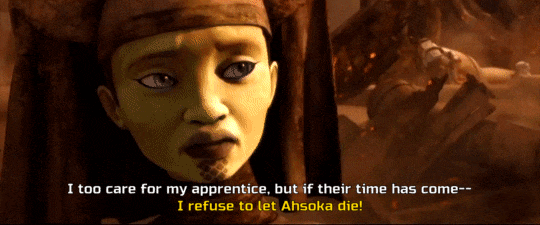
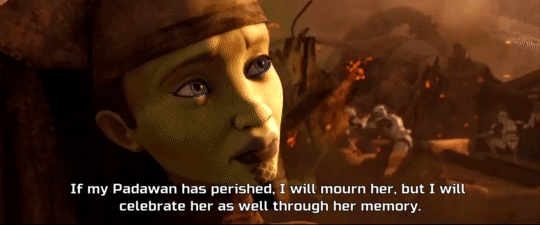
That is not the face of someone who doesn’t care. She even smiles brightly in relief when Barriss is shown to be okay, that this really doesn’t convey “detached” in an unloving or uncaring way. (We’ll get to attachment later, that’s definitely coming.) (I’m also mostly skipping the political thing, because I think that’s just a fundamental disagreement of whether Jedi should or should not lean into politics. My view basically boils down to that I think ALL OF US should be leaning more into politics because we are citizens who live in the world and are responsible for it, and the Jedi are no different. This is evidenced by: - M&A’s storyline has Qui-Gon and Obi-Wan saving the day specifically because they play politics, that’s how they manage to free the slaves, through playing politics and being part of the Republic/having Senate backing. - The Clone Wars has shown that the Jedi believe “lasting change can only come from within” and “it’s every citizen’s duty to hold their leaders accountable” when Ahsoka teaches the cadets on Mandalore, as well as that politics are not inherently bad, given that Padme and Bail are working to make the system better or “create lasting change from within [the system]” - ”Trying to serve the greater good does not always make you popular” says Padme Amidala in a very caring speech - Star Wars Propaganda makes the case that the Jedi might have won the war had they leaned more into politics. - Sometimes the Jedi get unfairly accused of playing politics when there’s just no good choice and they still have to choose one or the other.) But Qui-Gon is ahead of them [re: caring and loving] all and that’s why he’s not part of the council. This is flat-out wrong in regards to canon. Mileages are going to vary, of course, on how much one takes a novel into consideration, but Dave Filoni is not a fan with the luxury of deciding what is or isn’t canon, he works on Star Wars where canon is canon. Now, does that mean canon will never contradict itself, especially if Dave gets to write something for Qui-Gon? Of course not, SW isn’t immune to continuity errors and they themselves have never said otherwise, even when fans want to hold them to that standard. However, this is still pretty much a big “that’s not what happened” instance. In Master & Apprentice, the Jedi Council offer a seat to Qui-Gon on the Council, specifically BECAUSE he has different opinions from them and they welcome that. (Excerpt here.) “We hope it will also be our gain,” Mace replied. “Qui-Gon Jinn, we hereby offer you a seat on the Jedi Council.” Had he misheard? No, he hadn’t. Qui-Gon slowly gazed around the circle, taking in the expressions of each Council member in turn. Some of them looked amused, others pleased. A few of them, Yoda included, appeared more rueful than not. But they were serious. “I admit—you’ve surprised me,” Qui-Gon finally said.“I imagine so,” Mace said drily. “A few years ago, we would’ve been astonished to learn we would ever consider this. But in the time since, we’ve all changed. We’ve grown. Which means the possibilities have changed as well.” Qui-Gon took a moment to collect himself. Without any warning, one of the turning points of his life had arrived. Everything he said and did in the next days would be of great consequence. “You’ve argued with my methods often as not, or perhaps you’d say I’ve argued with yours.” “Truth, this is,” Yoda said. Depa Billaba gave Yoda a look Qui-Gon couldn’t interpret. “It’s also true that the Jedi Council needs more perspectives.” Ultimately, Qui-Gon is the who turns them down and gives up a chance to shape the Jedi Council because he doesn’t like the shape they’re taking. That he does become less political, but this is after he’s argued that the Jedi should be working to push the Senate harder, so when he has a chance to help with that, he turns it down. It has nothing to do with caring and loving, it’s about Qui-Gon’s desire to not have to deal with the work himself, when he wants to be more of a hippie Jedi. (I’ve written a lot about Qui-Gon in M&A, why I actually think it’s really spot-on to someone who can be both really kind and really kind of a dick, but it’s not the most flattering portrayal, even if narrative intention likely didn’t mean what came across to me. I think this post and this post are probably the most salient ones, but if you want something of an index of the web that’s being woven with all the various media, this one is good, too.) So he’s fighting for Anakin and that’s why it’s the ‘Duel of the Fates’ – it’s the fate of this child. And depending on how this fight goes, Anakin, his life is going to be dramatically different. I have only ever seen George Lucas talk about Anakin’s fate in one instance and it’s this: “It’s fear of losing somebody he loves, which is the flipside of greed. Greed, in terms of the Emperor, it’s the greed for power, absolute power, over everything. With Anakin, really it’s the power to save the one he loves, but it’s basically going against the Fates and what is natural.“ –George Lucas, Revenge of the Sith commentary I’ve made my case about why I think Anakin’s fate is about that moment in Palpatine’s office, and so I’m not fundamentally opposed that “Duel of the Fates” is about Anakin’s fate, but here’s what George has provably said about the “Duel of the Fates” part of the story: - In the commentary for The Phantom Menace during “Duel of the Fates” and none of Dave’s speculation is even hinted at, there’s more focus on the technical side of things and the most George talks about is that it’s Obi-Wan who parallels Luke in going over the edge during the fight, except that instead of a Sith cutting off a Jedi’s hand, it’s a Jedi cutting a Sith in half, drawing the parallels between them. - He does say of the funeral scene that this is where Obi-Wan commits to training Anakin and how everything is going to go (though, in canon we see that Obi-Wan still struggles with this a bit, but Yoda is there to support him and nudge him into committing even more to Anakin, because the Jedi are a supportive community to each other). This is some solid evidence for that Obi-Wan is already caring about Anakin beyond just Qui-Gon. - Then here’s what he says about the “Duel of the Fates” fights and themes of them in "All Films Are Personal": George Lucas: “I wanted to come up with an apprentice for the Emperor who was striking and tough. We hadn’t seen a Sith Lord before, except for Vader, of course. I wanted to convey the idea that Jedi are all very powerful, but they’re also vulnerable — which is why I wanted to kill Qui-Gon. That is to say, “Hey, these guys aren’t Superman.” These guys are people who are vulnerable, just like every other person. “We needed to establish that, but at the same time, we wanted the ultimate sword fight, because they were all very good. It sort of predisposes the sword fight between Anakin and Obi-Wan later on. There’s real purpose to it. You have to establish the rules and then stick with them. The scene illustrates just how Jedi and Sith fight and use lightsabers.” “So Qui-Gon loses, of course. So the father figure, he knew what it meant to take this kid away from his mother when he had an attachment, and he’s left with Obi-Wan. Obi-Wan trains Anakin at first out of a promise he makes to Qui-Gon, not because he cares about him. We’ll get to the “attachment to his mother” thing in a bit–but, for now, let’s just say, George Lucas’ words on this are not that attachment to her was a good thing. Fair enough that “not because he cares about him” is up to personal interpretation, but canon has also addressed the topic of Obi-Wan’s treatment of Anakin and Obi-Wan stepped up to the plate on this. In addition to how we see Obi-Wan REPEATEDLY being there for Anakin and being concerned and caring about him, they specifically talk about Qui-Gon and overcome this hurdle.
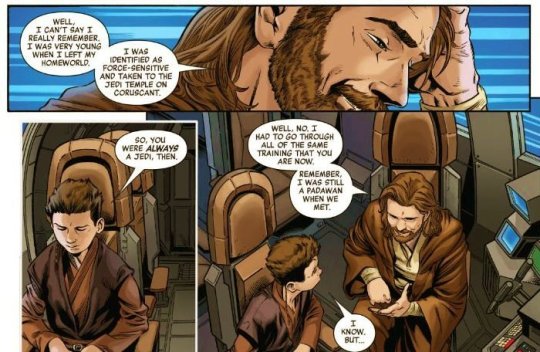
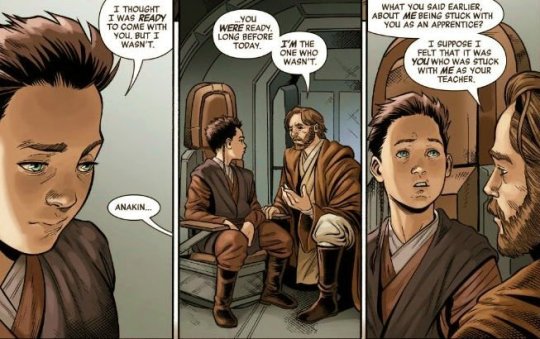
No, Obi-Wan is not Anakin’s father figure, on that we definitely agree. Anakin never really even treats Obi-Wan like a father–he says “you’re the closest thing I have to a father” in Attack of the Clones, as well as he says Obi-Wan practically raised him in The Clone Wars “Crystal Crisis” story reels, but Anakin has never actually acted like Obi-Wan is his father–”then why don’t you listen to me?” Obi-Wan points out in AOTC–as well as Obi-Wan glides past those remarks, which I’ve always taken that he doesn’t want to reject Anakin’s feelings, knowing that Anakin can be sensitive about them, but neither does he want to confirm them. This does not mean Obi-Wan was not supportive, caring, and loving. He says, “I loved you!” to Anakin in Revenge of the Sith, he asks after him and if he’s sleeping well in Attack of the Clones, and even George Lucas himself said that the elevator scene was set up TO SHOW OBI-WAN AND ANAKIN CARE FOR EACH OTHER:
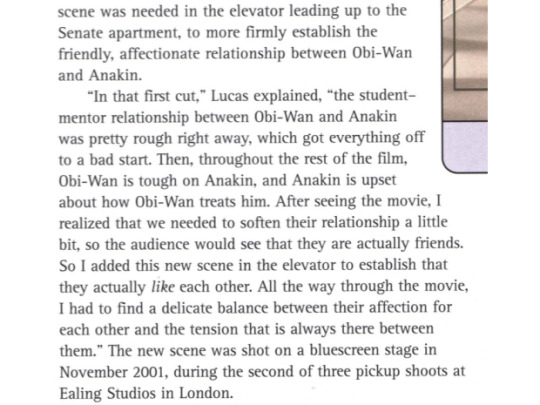
PUTTING THE REST UNDER A READ MORE FOR A BETTER LENGTH REBLOGGABLE VERSION, IF YOU WANT.
Keep reading
1K notes
·
View notes
Note
Hi. This came about because I've seen a few of your posts with a list of George Lucas quotes and feel you've done a lot of research. In any of the quotes you've come across, has Lucas ever mentioned that if Qui-Gon had survived the fight with Maul that Anakin would've remained in the Light? I'm aware Filoni has discussed this topic but I haven't come seen anything from Lucas on it. Thanks for any assistance you can provide.
Hey there! Sorry for the incredibly late reply, had to gather all the relevant quotes and lay out my thoughts!
Note #1: This is such a very, VERY big subject, so the answer is gonna be long. Good news is, the bulk of this post is gonna be quote pictures and GIFs! If anybody wants to read another breakdown of Filoni’s interpretation of the Prequels, that also takes Canon material into account, I’ll refer you to @gffa’s masterfully-written post here.
CONTEXT:
The question asks about this interpretation that Dave Filoni has of the fight between Qui-Gon and Darth Maul, posited in Disney: Gallery - The Mandalorian:

Many people go with the notion that “Dave Filoni is basically George Lucas’s ‘Padawan’, so what he says is in line with Lucas’s vision.”
So... is it?
SHORT ANSWER:
No.
Lucas never publicly mentioned any of this was the case. At times, he outright stated the contrary.
LONG ANSWER:
#1: Why the title "Duel of the Fates"?
Quotes from George Lucas and John Williams mention nothing about how this duel between Qui-Gon and Darth Maul will decide Anakin's fate.
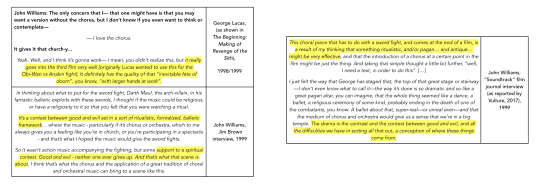
Per John Williams, it’s about the conflict between Good and Evil.
Probably why, instead of being re-used in the fight between Anakin and Obi-Wan like it was intended to, Lucas used this theme in the duel between Yoda and Sidious. A duel that Matthew Stover sums up beautifully as:
“The expression of the fundamental conflict of the universe itself. Light against dark.”
#2: When is Anakin's fate decided, according to Lucas?
The notion that Anakin was doomed to fail from the get-go is going against the principle of choice that George was adamant to include in the Prequels.
Yes, fate/destiny plays a part in Star Wars, but whether you follow it is contingent on your choices and the choices of those around you. As Lucas puts it:

If I had to think of an example:
Darth Maul was Darth Sidious’ apprentice and eventual heir. He chose to give in to his arrogance - as he usually tended to - and mess around with Obi-Wan instead of just pushing him down the reactor shaft with the Force and secure the kill...

... and that cost him his future. For the rest of his life, Maul was never able to gain access to the power he had once been promised, when he was destined to become so much more.

So, in this case:
Anakin is the Chosen One. AKA, the Force chose him to destroy the Sith (who keep trying to enslave the Force and bend it to their will) and bring Balance to the Force. That’s his destiny, his fate. However, Anakin chooses to join the Dark Side and, thus, completely destroys the Balance and leaves the Force in darkness.
But this fall wasn’t decided by the outcome of some duel.
It was a progressive process that was mainly decided by Anakin’s own flaws and choices...

... and Palpatine’s manipulations (which influenced Anakin into making those choices rather than wiser ones).

Says Lucas, the first real step was killing the Tuskens in a fit of rage and then vowing he would never let anyone close to him die again. Another step was killing Dooku, knowing he was defenseless.

The definitive final step, the moment where Anakin’s future was truly decided and he turned, was letting Mace die and joining Sidious in order to stop Padmé from dying, AKA going against the Fates and the natural cycle of life and death.
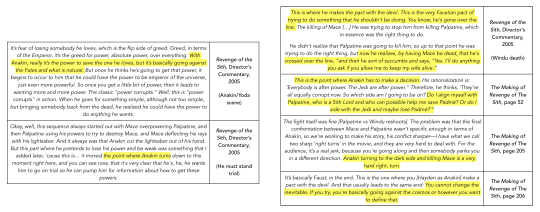
(Quick aside, that’s where the George Lucas stroke of genius is, for me; Anakin goes against the Fates by going against his own fate. Brilliant.)
Each of these actions individually aren’t enough to cause one to fully fall to the Dark Side. Put together, with one action building up to the next? That’ll do it.
It was a collection of bad choices that made Anakin fall. Conversely, it was one good choice that made him rise again.
The Force is screaming at Luke that if he’s not careful, he’ll become the next Darth Vader. Luke eventually manages to listen to that warning, reject his hate for Vader and embrace the compassion he has for his father... and thus allows Anakin to finally embrace his own fate, fulfill his destiny and bring the Force back to its natural balanced state.
Note #2: Out of 507 collected quotes from Lucas, there’s about 214 that are relevant to this subject. In none of the 214 are the Jedi ever mentioned as having had a hand in Anakin’s fall. Which brings us to the next point:
#3: Are the Jedi compassionate?
Here's what Filoni says about this (left) vs what Lucas says (right).

Note #3: these are only the quotes where Lucas explicitly says Jedi are compassionate. There’s a bunch more where he explains that Jedi are allowed to love and specifies the difference between greed and compassion, which can be found in this post.
Filoni says the Prequel Jedi should be compassionate, in theory, but aren’t (but not Qui-Gon, Qui-Gon is ahead of them all).
Lucas says Jedi are compassionate, period. Note how he doesn’t make a distinction between “Prequel Jedi” and “OT Jedi”. They’re just Jedi.
#4: Qui-Gon & the Jedi Order.
To sum up Filoni’s reasoning in the previously posted quotes:
The Prequel Jedi lose the war.
The Prequel Jedi talk are political.
The Prequel Jedi are dispassionate.
The Prequel Jedi were deceived by the Sith.
Yoda says the Prequel Jedi are arrogant, in Episode II.
Qui-Gon hasn’t been allowed on the Council.
CONCLUSION: The Jedi have lost their way by becoming detached, dispassionate, arrogant and political, which is how they were deceived by the Sith and joined the war and couldn’t sense Sidious even though they were in the same room as him every day. The only one who is still being a Jedi the right way is Qui-Gon, who is compassionate and knows that you can love people without possessing them. Because of this viewpoint, he hasn’t been allowed on the Council. By extension, Obi-Wan, Anakin and Ahsoka are also sort of special because they’re coming from his lineage.
Dave Filoni isn’t the only one who holds Qui-Gon up as this figure who is ahead of the curb, the one True Jedi who is still follows the real path. A lot of fans who read the EU books, specifically the Jedi Apprentice series, see him this way. It’s actually a very popular interpretation.
But almost all the stuff that’s in the Jedi Apprentice series comes from Jude Watson, Dave Wolverton, David Levithan and LucasFilm editors Sarah Hines Stephens and Jane Mason. Not George Lucas.

Tahl, Siri Tachi, Qui-Gon’s characterization, these were all elements decided on by Jude Watson and Dave Wolverton in order to create sources of drama for the stories they were telling. Aside from the script and Terry Brooks’s novelization of The Phantom Menace, they basically had carte blanche to define Obi-Wan and Qui-Gon.
So what did Lucas say about the Jedi and Qui-Gon?
#1. Jedi are indeed allowed to love. Qui-Gon isn’t the only one who knows you can love someone without being attached to them. That’s standard Jedi stuff.
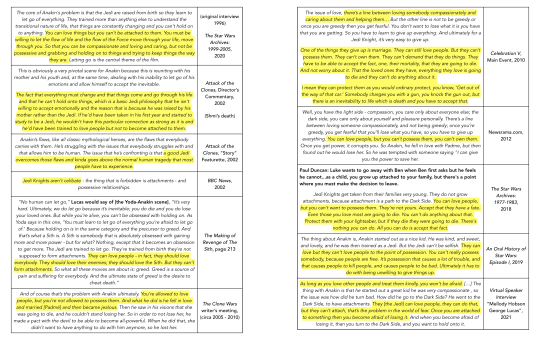
It’s part of the teachings.
We know this because Anakin - despite having problems applying it - literally explains the Jedi principle of non-attachment to Padmé in Episode II.

#2. Qui-Gon in Lucas’s mind. Let’s just look at how Lucas describes the character itself.

Okay, so Lucas says that Qui-Gon is a rebel, a maverick, who is bold and doesn’t go along, who pushes the envelope and moves beyond the bounds. He’s not neutral, he’s got firm principles and does things his way. He’s a strong, noble, centered character.
But nowhere does Lucas say that he’s “ahead of the rest of the Jedi” or that he’s “special” in some way. He’s a Jedi who disagrees with the Council and operates differently than they usually do. That’s it.
On the contrary, while Lucas does grant Qui-Gon’s instinct about Anakin is correct, he defines his decision as “wrong”, “controversial” and “the source of much of the problems that develop later on”. And if you look at the quotes piled on the left, there’s a very clear similarity drawn between the characters of Qui-Gon and Anakin. So the decision of taking Anakin from his mother and demanding the Jedi train this kid filled with fear as a Padawan straight away is meant to be framed as an impulsive move on Qui-Gon’s part, not unlike one Anakin would make.
But hey, let’s look past Lucas’s words, at what was said about Qui-Gon right before and right after The Phantom Menace was released:

Pretty much the same stuff. Headstrong, maverick, unruly. He feels and acts on instinct, rather than hanging back and thinking, he’s very empathetic. He’s more prone to action than your average Jedi.
At no point, be it in Lucas’s words or in the material released alongside Episode I, do we see anything about him “being more compassionate than your average Jedi” or “being the only Jedi to know that you can love someone without getting attached”.
Why?
Because it’s a character trait that was added later, in the now-non canon EU, and not by Lucas.
#3. Why the Jedi get deceived by the Sith.

The Jedi know the Dark Side has clouded everything. It’s not just the Sith. It’s the Hutts, it’s the corrupt Senators and greedy bureaucrats, it’s the pirates, etc. Tracking down the Sith’s specific brand of evil is like looking for a needle in a haystack.
The Jedi are one of the last meaningful beacons of light in the galaxy and they’re just being overwhelmed. They’re being deceived because instead of meeting them on a battlefield, the Sith decided to use politics (which the Jedi suck at) as a weapon and turn the very thing the Jedi were fighting for into what brings about their end.
But hey, no mentioning of “lack of compassion” or Qui-Gon, here. Moving on.
#4. The Jedi being political & losing the war.


They’re ambassadors of the Senate. They’re not political, their role is diplomatic. We see them continuously abstaining from getting involved in politics until the war forces them to.



Then, when they’re in the war, they’re getting manhandled by literally every politician shown in TCW (because of course they are, they’re warrior monks; once again, they suck at politics).
They lose the war because they’re not soldiers, they’re diplomats. They didn’t wanna fight it in the first place, Lucas makes it clear that they were drafted into service. And the reason they didn’t dodge the draft is because the Separatists were enslaving planets and hurting people by testing weapons on them, neutrality be damned.
It’s clearly shown, multiple times throughout canon, that the Jedi don’t want to be involved in it and yet Palpatine continuously orders them to keep on fighting.



Now, the war does make the Jedi lose their way and compromise on their principles. It’s designed to do so, it’s one big political manipulation (and seeing as the Jedi suck at politics, they fall for it). And sure, they do lose sight of the little guy to focus on the war effort, but all that really does is that the bulk of the galaxy doesn’t mourn the Jedi’s downfall, it doesn’t cause that downfall.
So again, it’s got nothing to do with them being dispassionate or anything like that.
#6. What Yoda really meant by saying Jedi were arrogant. George Lucas comments two times on the subject of “Jedi arrogance” in the director’s commentary of Attack of the Clones.

So the Jocasta Nu scene is meant to represent this idea that the Jedi are completely disarmed in front of the upcoming conflict. They’ve grown lax, complacent, they’ve lowered their guard (which happens, in times of peace).
Note #5: To be fair towards Madam Jocasta, she couldn’t have possibly suspected that Dooku - once the best Jedi in the Order bar Yoda - erased Kamino from the Jedi Archives because he had become a Sith about 15 years prior.
Still, them being complacent has nothing to do with them getting “dispassionate” or “detached”.
Like, even if they were (which they’re not, as pointed out in the previous section and point #1: they are compassionate and they are allowed to love), it wouldn’t be relevant because being less compassionate isn’t what makes you miss a planet getting erased from the Archives. If anything, they were so compassionate and trusting towards Dooku that it enabled him to sabotage the Archives the way he did.
Then we get to the Yoda scene.

Here’s what Lucas had to say.

While Yoda is generalizing, the subtext in his words is: “Obi-Wan, cut the kid some slack, you can be arrogant too, sometimes.”
Which, to be frank...

... is a fair point.
But I’d argue that’s part of an arc Obi-Wan and Anakin go through, in Episode II.
We start out in Episode II and their relationship is good. They’re joking around, there’s a symbiosis, Obi-Wan’s the by-the-book one, Anakin’s the boundary-tester, they complement each other. That’s why the elevator scene is there, it’s to establish what their relationship is normally like.

And Lucas said in 2008: you wanna see Anakin (and, by extension, his relationship with Obi-Wan) under normal circumstances? Watch The Clone Wars.

So they’re all good, minus the occasional bickering you’d get in any parent-child relationship... then Anakin sees Padmé for the first time in 10 years and she calls him a “little boy”. This makes Anakin overcompensate in hopes of impressing her and causes tension between him and Obi-Wan.
From that point on, Anakin gets more impulsive and petulant than he usually is, and Obi-Wan becomes more of a stern, overprotective, helicopter parent.
They both think they know better, and they both have valid points:
Anakin is better and much more skilled than your average Jedi and so a lot of the concerns Obi-Wan expresses aren’t necessary, he’s just nagging and questioning him pointlessly.
But Anakin does also have a tendency of getting too cocky, overestimating his abilities and putting his own emotional wants before his duty, which usually gets him into a lot of trouble.
By the end of the movie, Obi-Wan learns to put faith in his Padawan’s judgement and abilities...

... and Anakin does begin to put his duty before his wants...

... but he still lets his emotions rule him and overestimates himself, which costs him an arm.

While we’re on the subject, let’s segue to the next (and second-to-last) section.
#5: Obi-Wan as a teacher, compared to Qui-Gon.
So regarding the thing Filoni said about Obi-Wan not being a father figure, but a brother figure... I mean...


... but that aside, Lucas makes it clear that Obi-Wan is basically filling both roles, as a mentor.

Lucas doesn’t pin Anakin’s failure on Obi-Wan. As he explains... he did his best.
The problem wasn’t that Obi-Wan wasn’t up to the task, it’s that Palpatine was always sabotaging his teachings so that Anakin would learn the theory but never apply it. Had Palpatine - I dunno - tripped and fallen to his death upon being made Chancellor, Anakin would’ve turned out A-Okay.
But in reference to Obi-Wan’s attitude towards Jar Jar and Anakin, in Episode I... that’s also part of Obi-Wan’s arc.
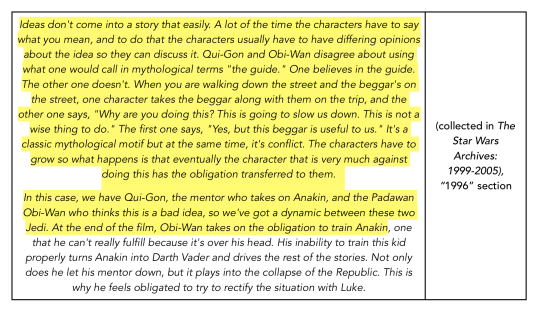
Note #6: In 1996, while developing the storyline for the Prequels, Lucas did indeed toy with keeping the idea (which was hinted in ROTJ), that "Obi-Wan was too ambitious and failed to train Anakin", as I explain in this post. But as development went on and the character of Qui-Gon was created, the idea was retconned in service of re-centering more on the main themes of the Prequel trilogy: how a democracy becomes a dictatorship and how a good man becomes bad. Spoiler alert, the answer to both is that “it happens from within.”
In Episode I, Obi-Wan’s arc is learning to listen to “the Guide”.
Obi-Wan’s attitude isn’t indicative of the Jedi in general. It’s just who he is. Call it a personality trait or a full-on flaw, he’s a guarded, prudent person. As opposed to Qui-Gon, who is much more bold and listens to his instincts and the Living Force, instead of bogging himself down in thought. Because of this, Qui-Gon is likelier to listen to people like Jar Jar and Anakin (aka, the Guide) than Obi-Wan.
There’s literally a comic published in 1999 about this specific thing.

When Qui-Gon finds Jar Jar, Obi-Wan thinks it’s pointless and it’ll just weigh them down. When Qui-Gon finds Anakin, Obi-Wan is wary 'cause this kid might be dangerous... and he is proven wrong on both accounts. Jar Jar is key to the Naboo’s alliance with the Gungans and Anakin wins the Battle of Naboo.
So guess what? While he’s reluctant at first, he decides to train Anakin, with or without the Council’s approval. He takes on some of that rebelliousness Qui-Gon had. He learns to trust the Guide.
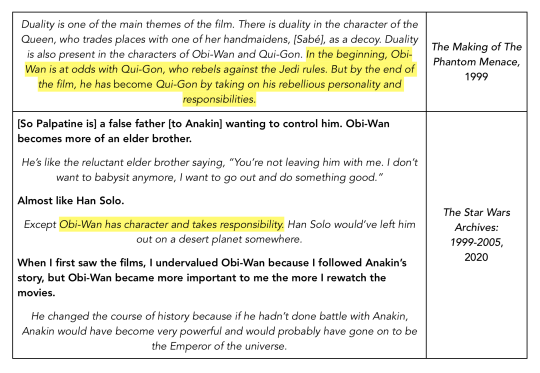
Skip to 10 years later, and his go-to is listening to the Guide, this time personified in Dexter Jettster.

There you go, that’s Obi-Wan’s arc in Episode I.
It’s not about Obi-Wan being “uncaring”, it’s about him learning to believe in the Guide as Qui-Gon would.
#5: Dave Filoni’s headcanon.
Finally, I wanted to clarify that this does not mean “Filoni doesn’t know jack about Star Wars”. A lot of the stuff he says about how the Force and the Dark Side work is similar to what Lucas said and did. For the most part, he does get it.
If I had to hazard a guess, I'd say the conversations in Disney Gallery: The Mandalorian (including the part where Dave talks about the Prequels) must've been edited around a bit, for pacing purposes. Y’know, like, trimming some of the various "uhms" and "likes" and "y'know" and side-trackings, that sort of stuff which happens all the time with documentaries.
‘Reason I think this is that every time Dave brings up interpretations like this one, he's always careful to clarify that this is just his headcanon. It's how he sees things, not necessarily how they are.

So my guess is that Dave must've mentioned - at some point in that conversation - that this was all his headcanon, and that bit just got removed because the editor(s) felt that it was obvious and didn't need it to be stated out loud.
Note #7: It’s worth pointing out that I obviously have no definitive proof that Filoni’s headcanon is not in line with George Lucas’s as I’m not a telepath, and, really, all I’ve got is a collection of quotes, whereas Dave spent the better part of a decade working alongside George and learning from him. I can say, though, that it doesn’t align with everything Lucas said and didn’t say *publicly* about the Jedi in the Prequels.
Also, while he’s not talking about Jedi (he’s talking about Kallus and Zeb becoming friends in Season 2) I think this quote could give us an idea of where Dave is coming from with this interpretation:

So Dave is clearly describing a personal source of inspiration in the above quote. If that is also where he’s coming from with the “Prequel Jedi were detached/Qui-Gon as ahead of them” interpretation, I can’t really blame him for choosing to see the Prequels through a prism that makes them bearable for him. At least he’s engaging with the content rather than bashing it.
Which is more important than you’d think.
I’m a Prequel kid, and grew up loving BOTH the Original Trilogy and the Prequels, with a preference for the latter. But I couldn’t properly enjoy these films (for which I was the target demographic) without also seeing 30+ year olds (who weren’t the target demgraphic anymore) criticize the Prequels and The Clone Wars into oblivion because it wasn’t what they were hoping for.
Then one day, in university (2014, good times), we were asked what our favorite film was. I reluctantly said my favorite movie is “Revenge of the Sith, and I know it’s a bad film, but screw it, it’s my fav--
-- and all my classmates - Prequel kids like me, now grown up - interrupt me saying that “What? It’s not a bad film! The Prequels are awesome!” and listing everything they loved about those movies for a full minute.
Holy shit, how good that felt.
And Dave clearly gets that, as indicated by this quote.

If you go back to what he says in Disney Gallery: The Mandalorian, he admits stuff like the Jedi Council isn’t something he was expecting. But rather than whining about it, he had the creative instinct to put a spin on the Prequels that came from a personal place, which enabled him (and other people from his generation) to like them more.
And I’m grateful for that.
But when people online say Dave’s headcanon is exactly what Lucas was going for when making the Prequels... sorry, but - judging only by the George Lucas quotes I’ve collected till now - I’m gonna say that’s not the case.
Which means that depending on how you see the Prequels, this headcanon about the Jedi Order is either an improvement on what the author originally intended to convey, or a deterioration.
829 notes
·
View notes
Text
The Jedi Code is like an itch.
Consider who the three main characters of Obi-Wan Kenobi are.

Obi-Wan, Vader & Reva. What ties them all together?
They’re all trying really hard to NOT be Jedi… even though, deep down, that’s who they are.
Because as the Grand Inquisitor puts it: the Jedi Code is like an itch; they cannot help it.
Take Obi-Wan, for instance:

He's saying: “I’m not a Jedi anymore. That guy died the same day Anakin did. I’m just Ben.”
But it kills him that he can't help Nari, he can't help that dude who can't feed his family, he can't help those settlers on Mapuzo who were getting bullied by stormtroopers.
His character arc is the most obvious one: he is coming to terms with the idea that, yes, he still is a Jedi.
Because that’s who Leia needs him to be right now.

And it’s who Luke will need in the future.
Also Vader:
We know Vader’s arc won’t conclude in this series.

For years, Vader is always THIS close to going back to the Light, then always stomps his foot on the ground and doubles down, going “nu-uh, I’m evil deep down inside, I swear! Dark Side all the way! Look how I’m killing this guy! See what a monster I've become Obi-Wan?!”

He keeps rejecting the Light and rationalizes his actions by saying the Jedi betrayed him, but deep down, he’s rejecting the Light because he thinks he deserves the pain that the Dark gives him. He’s a monster and he is where he belongs: in Hell.
But we know that, eventually, he lets go of the guilt, the anger, the fear, and does become that Jedi again, which George Lucas once described as “ultimate father figures”.
Because that’s what Luke needed when the Emperor was killing him: his father, the Jedi.
Now take Reva:
She's saying: “I’m not a Jedi. The Jedi abandoned me. I hate them and I’m gonna have my revenge!”
That whole speech she gives in Part I?
She’s not saying that to the Tatooine randos (who the Jedi never protected in the first place because they had no jurisdiction in the Outer Rim). She’s repeating that to herself.
Clearly, she was a youngling when Order 66 happened, she got taken in and made into a monster. But not really, right? ’Cause the other Inquisitors? Now those guys are full-on psychopaths. She’s cute compared to them. They tell her as much.

She’s not as broken inside as they are.
And deep down, she knows it too. Which is why she screams, she pouts, she’s overly arrogant, reckless, mean and insistent, she’s overdoing it, she’s overcompensating.
“Look at my flips! Look at how I parkour! Would a Jedi be so badass?!”

She’s doing exactly what Vader is doing.
Only she’s doing it louder, because the good in her isn’t buried as deeply as it is with him. She’s stomping her foot and doubling down and insisting that “no, I’m bad, I swear”.
Because the alternative is accepting that - unlike Vader who made his own choices - deep within Reva lies the truth that what happened to her wasn’t her fault. She’s a victim of a galaxy-wide genocide. And it's not her her fault. Sometimes, bad things happen to good people, and it's unfair.
Which is why Haja takes her by surprise.

Why would this guy WILLINGLY say he's a Jedi? Is he crazy? Doesn't he realize what that comes with? The target it puts on your back?
Seeing him do that clearly hits her where it hurts.
Now, I don’t know if she eventually arcs and manages to become that Jedi once again… or if she’ll die trying… or if she does like Vader and rejects it for good.
There’s a reason Reva and Moses Ingram are positioned in the middle in all promotional pictures featuring the trio:

My guess is that, aside from just aesthetic reasons, it's partially because while Kenobi is coming around to following the Way of the Jedi again, and Vader is just blazing trails in the opposite direction… Reva’s fate is unclear.
1K notes
·
View notes
Text
If instead of "keeping peace & justice in the Republic", the Jedi's task was "carrying a couch"...
About 1,000 years prior to The Phantom Menace, the Jedi see the Senate trying to get the couch off the ground and go:
Jedi: "Uh, need some help?" Senate: "Oh God, yes please...!" Jedi: "Cool, what's the plan?" Senate: "You carry the back end, we carry the front and lead the way. It'll go smoothly from here."
And for a solid millennium, this arrangement works and the couch moves forward without ever being dropped.

But by the time of the Prequels, the Senate has stopped carrying their end. Instead, they're sitting on the armrest, on their phone, online gambling or taking selfies for their InstaStories, they're having fun, talking with their buddies. They're being irresponsible and absolutely self-serving.
So the Jedi are in a situation where they have to PUSH the couch alone because if they don't, that's it, the couch is dropped.
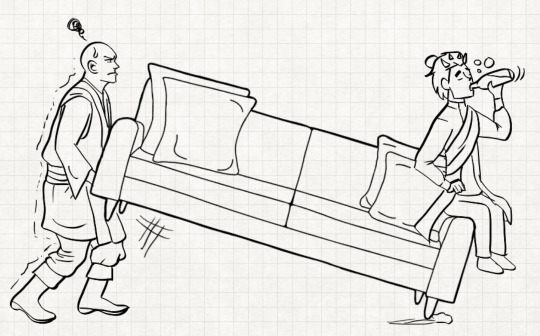
And it's SUPER difficult, but hey, at least the couch is moving, right? Dunno for how much longer they can keep this up, though.
As this goes on, a Sith Lord sees this entire ordeal and decides to JUMP on the couch, speeding up the clock on the inevitable drop.
Then the Clone War happens, which is the equivalent of the Jedi needing to keep trying to push the couch using only ONE hand, while they use their other limbs to fight off the Separatists and get that Sith Lord off the couch.

Then Order 66 happens, the Jedi are dead and the couch is dropped.
Mission failed, "long live the Empire".

Now, this is just an analogy simplifying the events.
If we go by what George Lucas said on the Jedi's role in the Republic, there's quite a few differences between "carrying a couch" and the Jedi's ordeal.
For instance, it's not just the Jedi carrying the other end of the couch, there's also people like Bail and Padmé (otherwise the couch would've stood still a while ago).
Also, when you're helping someone carry a couch, you can just walk away if the other guy acts like a jerk. But in the case on the Jedi, they can't just walk away because they pledged themselves to the Republic. They made a vow and a system has been built around it, they can't just up and leave or say "no, fuck you Senate, we out". Because the principles of the Republic are worth upholding and the system works when the Senate isn't filled with douchebags, as shown by the fact that there was peace and prosperity up until the Prequels.
Finally, in the analogy, moving the couch only benefits the other guy, right? But in this case, the Jedi's role in the Republic actually helps everyone, which is why the Jedi joined in the first place. If they leave, they'd be abandoning the people of the Republic.

Point is, the Jedi are not meant to be seen as "the elite" or "the establishment" by the audience. They're the underdogs. They're pretty much the only ones still trying to do their jobs right and everyone around them has stopped giving a crap.
So saying "the Jedi failed" is redundant. Who wouldn't fail?
Which is why George Lucas never blames them, in his commentary about the Prequels. When he talks about what the Prequels are about, he never says it's about the Jedi's failure, he always blames:
the Senate for failing their duty to the Republic and giving it over to Palpatine with thunderous applause,
and Anakin, for failing to overcome his own personal flaws and giving in to his greed.
Sure, the Jedi are not perfect, but nobody ever said they were. Because while their failure is a plot element, it's not meant to be a focal point.
2K notes
·
View notes
Text
How the “Obi-Wan failed Anakin” subplot was retconned by George Lucas.
So an argument I see a lot in some “Obi-Wan failed Anakin” posts is saying “Ben failed Luke’s father, he said it himself in ROTJ”.
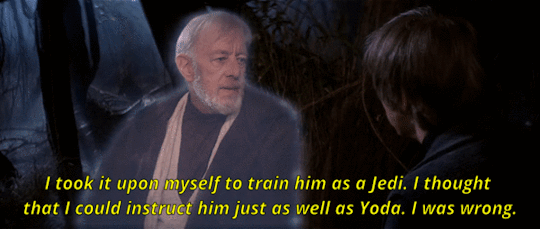
Now, while I could simply quote LucasFilm creative executive Pablo Hidalgo, who tweeted in 2017…
“If a fictional character thinks something, it doesn’t necessarily mean they’re right.”
… and leave it at that, I think it’s interesting to see just how far the “Obi-Wan failed Anakin” subplot went with Lucas, before he retconned it into something else entirely.
The original subplot:
In a story conference for Episode VI that was first transcribed in 1981 and later collected in The Making of Return of the Jedi (2013), Lucas discussed this with Lawrence Kasdan and Richard Marquand:

“Ben [takes] the blame for Vader. “I should have given him more training. I should have sent him to Yoda, but I thought I could do it myself. It was my own pride in thinking that I could be as good a teacher as Yoda. I wish that I could stop the pestilence that I’ve unleashed on the galaxy.” His burden is that he feels responsible for everything that Vader has done.”
And in an interview done with in 1996, collected in the book The Star Wars Archives: 1999-2005 (which I highly recommend getting, so insightful) Lucas discussed how he planned on portraying Obi-Wan in one of the earliest screenplay drafts for The Phantom Menace:

“The story has Obi-Wan as a young Jedi in his mid-twenties. He’s ambitious and takes on the mentorship of this kid who starts out about eight or nine years old. […] Even though he’s too old to start the training of a Jedi, Obi-Wan feels the Force is so strong with him that he has to train him as a Jedi. […] Obi-Wan begins as this strong Jedi character but when you see all six movies, you’ll see that what Ben is doing with Luke is very close to the same mistake he made with Anakin.”
So Obi-Wan was the only Jedi we saw for the first half of the script.
And, by the way… he wasn’t always in his mid-twenties. As concept artist Ian McCaig puts it:
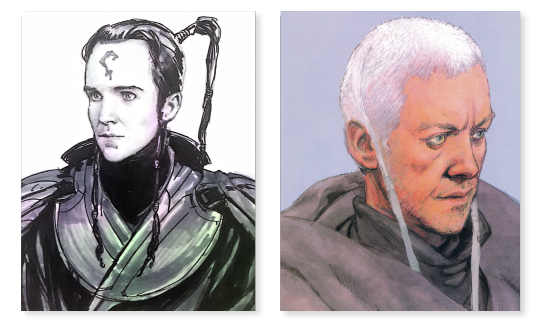
“Obi-Wan’s age changed all over the place — at one point he was substantially older, like a youngish 50. For a long time we had a character who was samurai-like, with a ponytail and long sideburns.”
So hey, bottom line (and as illustrated below by artist Doug Chiang):
Obi-Wan, alone, comes to negotiate with the Trade Federation. Just like he and Qui-Gon did in the final cut, he fights his way off the ship, he rescues the Queen…

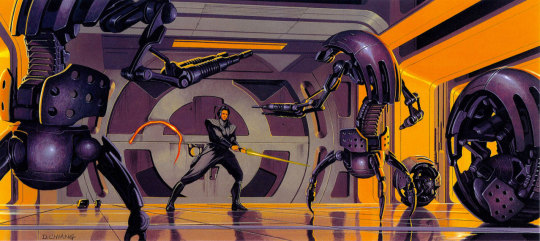
… and he finds Anakin.
He is impressed by his skills with the Force. He decides to bring him to the Jedi and he insists that Anakin should be trained.
So far, this is consistent with what is mentioned in Return of the Jedi, and it’s clear that, at this point in time, the narrative Lucas was originally going for was the notion that: “In his ambition and arrogance, Obi-Wan trained Anakin but overestimated his own abilities as a teacher, which ultimately resulted in the creation of Darth Vader.”
Bringing in Qui-Gon:
But months later, when tackling a newer draft of the script, Lucas decided to split Obi-Wan’s impact on the story into two… and that’s when he made the decision to give a bigger role to another Jedi who originally appeared much later in the film.
Thus was created a Jedi mentor for Obi-Wan called Qui-Gon Jinn.

“I wasn’t able to develop Obi-Wan’s character fast enough. When I got through the rough draft I realized that I had a second Jedi that comes in about halfway through the script who is an interesting character and the more I thought about it the more I thought of things I could do with these two Jedi together because one alone didn’t have much to react to.”
And when I looked further into it… this isn’t actually new information!
This was also mentioned in the old Databank on earlier versions of StarWars.com, and in The Art of Star Wars: The Phantom Menace, in which they also explain that they briefly considered making Qui-Gon be Obi-Wan’s Padwan, and having Ewan McGregor playing “Padawan Qui-Gon”, before they finally settled on having Obi-Wan be the apprentice instead.
Other fun fact: there’s a scanned copy of the 1997 shooting script online (you can download it here)… and in it, you’ll notice that in the scene where they have dinner at Shmi’s house, some of the character description still reads “OBI-WAN” instead of “QUI-GON”, because they forgot to replace some of them :D
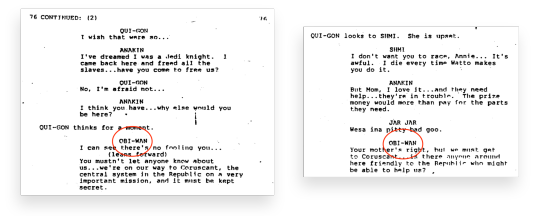
But as a result of bringing in Qui-Gon and shifting around the character dynamics, the decision of ambitiously taking Anakin in no longer falls on Obi-Wan… but on Qui-Gon.
How the addition of Qui-Gon changed the subplot:
If we look at things objectively, Qui-Gon saw a boy with an enormous M-count and massive potential in the Force, and figured “this kid must be the Chosen One”. And part of Qui-Gon’s character is that he feels, instead of thinking… he uses his instincts. And his instincts are never wrong (or so he thinks).
But while Qui-Gon’s instincts are correct (Anakin is indeed the Chosen One, no question there), he’s going about it the wrong way.

“So here we’re having Qui-Gon wanting to skip the early training and jump right to taking him on as his Padawan learner, which is controversial, and ultimately, the source of much of the problems that develop later on.”
- The Phantom Menace, Director’s Commentary, 1999
“I think it is obvious that [Qui-Gon] was wrong in Episode I and made a dangerous decision, but ultimately this decision may be correct.”
- Cut Magazine, 1999
He’s insisting this kid become a Padawan at once, without having him spend some time with the younglings to adjust… and everyone else is saying that that’s crazy. Cuz it is. But he is unable to consider the fact that he’s mistaken.
His instincts are never wrong, right? So he just keeps pushing for it.
Then he gets killed and with his dying breath, he forces the task of training Anakin onto Obi-Wan, who hasn’t even gone through the Trials, yet.
So right here, the original subplot has been retconned:
Obi-Wan no longer takes Anakin on because he’s an ambitious big-shot Jedi who arrogantly goes ‘pfft, if Yoda can do it, I can too’.
Instead, at the start, he takes Anakin on reluctantly… not because Anakin’s a problem, but because Obi-Wan feels that he, as a Master, won’t be up to the task.

Still, he steps up and takes on the responsibility. And while the task itself is ambitious, Obi-Wan doesn’t do it for the “glory of training the Chosen One”. He’s just keeping a promise, by being there for a 9-year-old kid who was taken away from his mother and whose paternal figure just died.
He decides to train the boy, honoring Qui-Gon’s memory.
The new subplot:
Now, while Obi-Wan’s fear that he may be inexperienced may be accurate in some areas… it isn’t in others. Namely, Obi-Wan’s ability to deal with a personality like Anakin’s.
Anakin had many character traits in common with Qui-Gon, including the following flaws:
They’re both headstrong, unruly mavericks.
Neither is very forthcoming about their own emotions.
Some people are outgoing, and need someone who will listen. Others are not, and need someone who will ask them and get them to talk. Anakin and Qui-Gon are examples of the latter. They get lost in their own thoughts and don’t open up unless they are pressed.
But this means that Obi-Wan already had experience dealing with this sort of personality before taking on Anakin. So he knows exactly what to do.
Whether Anakin is stressed…


… or is just bottling up his feelings…

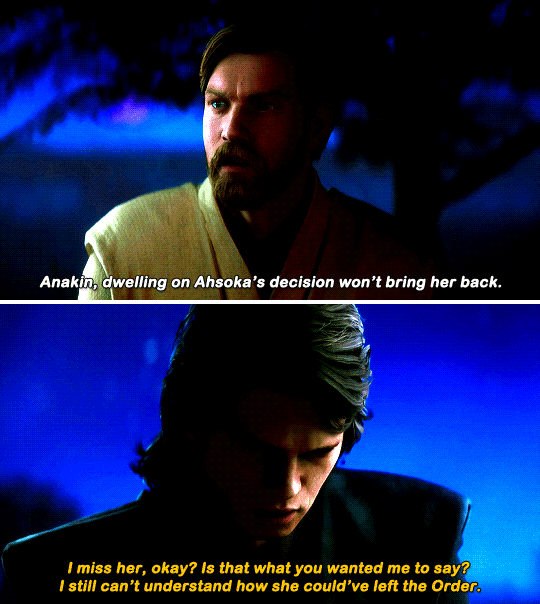
… most of the time, Obi-Wan will get Anakin to open up.
(credit to @ashleyeckstein for that last GIF)
As Lucas said:
“One of the primary issues between this relationship between Obi-Wan and Qui-Gon is that this is establishing Obi-Wan as the kind of straight arrow, the center of the movie, and Qui-Gon as the rebel, as the one who’s constantly sort of pushing the envelope. Which will switch itself in the next movie when, rather than having his master be the rebel, he has his Padawan learner become the rebel. I’m using Obi-Wan as sort of this centering device through all these movies, even as we get in with Luke and everybody else later on.” - The Phantom Menace, Director’s Commentary, 1999
Obi-Wan is a centering device.
He’s not so dogmatic that he will do anything the Jedi Council says, though he will try to stay within the lines. That said, you can change his mind, if your point is valid, unlike Qui-Gon who will hunker down on his own stance.
Obi-Wan is the middle ground (despite what the memes say 😃).
He’s the stable Yin to chaotic Yangs like Qui-Gon or Anakin.
So it turns out that pairing Anakin with a master like Obi-Wan… is actually a great fit! They complement each other, there’s a symbiosis.
And so he trains and practically raises Anakin as a paternal/fraternal figure, they become friends. Then, when Anakin is knighted, they become equals.
Anakin becomes an almost-perfect Jedi Knight, despite the terrible odds he faced. He is brave, kind, generous, powerful, loyal, he’s the best fighter pilot in the galaxy. He is more street-smart than your average Jedi, he has political connections like Bail or Padmé. He’s training a Padawan mere months after being knighted. By the end of the Clone War, this guy’s in the Top 3 fighters of the Jedi Order.
Anakin becomes a goddamn superstar, in the Jedi Order. And Obi-Wan is very proud of the man he’s grown up to be, despite the odds he was facing.
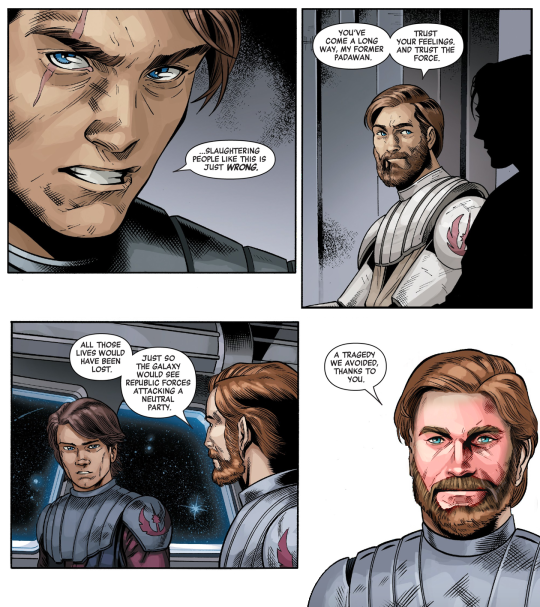
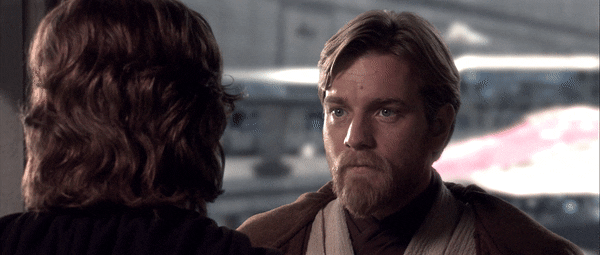
So eventually, Obi-Wan leaves for a mission which could turn out to be just a wild Bantha chase… he imparts one last lesson, says his goodbyes to Anakin…

… and comes back to this.

He is understandably devastated… and, of course, in true Jedi fashion, he blames himself:

But here’s the thing.
Forget that Obi-Wan is the ultimate selfless Jedi. Let’s put that aside.
Any parent would blame themselves for how their kid turned out. And sometimes? They’d be right to do so.
This isn’t one of those times.
Obi-Wan did his best; and Anakin’s choices - influenced though they may have been - were his own.
And that’s the new moral of Obi-Wan’s story, in the Prequels, according to Lucas.
“When you’re in this position as a mentor, whether you’re an actual father or not, this person is your charge, but you have no control over how they’re going to use that knowledge. […] You hope they’ll turn out okay, you hope they do the right things, you hope you raised them right, and all that stuff. But there’s no guarantee or anything. You never know what’s going to happen. That’s the challenge.”
Obi-Wan will never stop thinking he shares some blame in his boy’s downfall. We see that he eventually is able to see things more objectively in From A Certain Point Of View, though, clearly, in Return of the Jedi part of him still feels he is somewhat at fault.
But we, the audience, know: he did his best.
And if his teachings hadn’t been regularly sabotaged by Palpatine for 13 years, if the Devil himself hadn’t manipulated Anakin and turned his own fears against him… Obi-Wan’s best would’ve been enough.
3K notes
·
View notes
Text
It continues to amaze me that people think the Jedi Order is somehow a stagnant organization, set in its dogmatic ways and refusing to change. My friends, the Jedi Order existed for twenty five thousand years before it finally fell to the Sith. You really think an organization that has lasted that long is unwilling to change with the times? Even the Catholic church, one of the most dogmatic religions in the real world, which has only existed for not even 1/10th of the time the Jedi Order did, has changed and adapted with the times.
The problem was never that the Jedi refused to change to accommodate Anakin Skywalker. The problem was that Anakin Skywalker was never willing to accept the way of life of the Jedi*.
Which, let me say, is fine! Not everyone has to be a Jedi! Not even every Force sensitive has to be a Jedi! Just like not every Catholic has to make the decision to become clergy and follow rules that go above and beyond what others have to follow. And even within the clergy there are levels of vocation! Monks don't have to follow all the rules that a priest might.
So no. The Jedi Order did not need to change because Anakin Skywalker was selfish. The Jedi Order did nothing wrong, and never once forced Anakin to live by their values. The Jedi choose to follow their path, just like the countless number of clergy throughout the world for all of our various religions.
*Caveat: Yes, Anakin was manipulated by Palpatine from a young age. This definitely influenced him, but it was ultimately his own choice not to follow the path of the Jedi, just like it was eventually his own choice to give up on the Dark Side eventually. George Lucas says it himself that it is about a person's choices.
142 notes
·
View notes

